
Platform: Switch
Publisher: Nintendo
Developer: Nintendo
Release:
The announcement of Super Mario Bros. Wonder, which acted as the grand finale of June's Nintendo Direct, caught many off guard. Not only is Nintendo moving away from the well-worn tread of the New Super Mario Bros. franchise for the 2D side of the series, but it is taking Mario in new directions with a larger roster of playable characters, unprecedented gameplay conventions, and all-new power-ups. The result provided us with a trailer that not only garnered a massive reaction online when our favorite Italian plumber turned into an elephant, but also had us watching the footage on repeat in an attempt to ascertain as many details as we could from the limited gameplay we were shown.
Thankfully, I no longer need to rely solely on that trailer and my own speculation of what exactly Super Mario Bros. Wonder is, as I was invited by Nintendo to get a hands-on session with the upcoming 2D platformer. Super Mario Bros. Wonder takes Mario and his crew outside of the Mushroom Kingdom; instead, the Mushroom Kingdom squad pays a visit to the Flower Kingdom, an all-new setting for the team, headed up by Prince Florian.

While Florian is addressing the group, Kamek soars overhead, and Bowser swoops in, stealing the Wonder Flower, which transforms him into a giant airship. The evil king then flies around, wreaking havoc on the Flower Kingdom, vaporizing various parts of the world, and transforming the houses of the guards (known as Poplins) into prisons. As you might imagine, Mario and his friends agree to help Prince Florian restore order to his kingdom and regain the stolen flower.
As I embark on the journey, I'm given the opportunity to choose between the largest roster of playable characters in a mainline Mario game to date. Present on the character-select screen are Mario, Luigi, Peach, Daisy, multiple Yoshis, multiple Toads (including Toadette), and Nabbit. The characters play identically, with the exception of Yoshi. Yoshi is able to give other characters rides, can do his float-style jump, and doesn't take damage. However, the trade-off is that you cannot use power-ups as Yoshi. In past Mario games, that might be seen as a good trade-off, but the power-ups in Super Mario Bros. Wonder are so creative and sometimes essential to reaching secrets that you might want to reconsider picking Mario's dino companion.
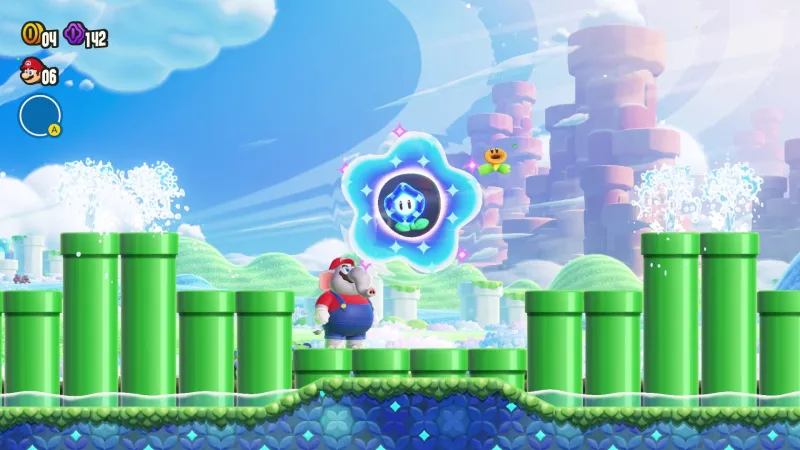
A Warm And Wondrous Welcome
Much of my hands-on time with the game comes in World I: Pipe-Rock Plateau. The first stage, Welcome to the Flower Kingdom, gives me a solid introduction to the way things work in this new adventure. Talking Flowers, like the ones prominently shown in the reveal trailer, are ever-present during the adventure. They commentate on the action, cheer you on, and sometimes even crack jokes. From my experience, they inject a ton of personality into each stage, which is further accentuated by how expressive the characters are in the refreshed art direction.
Before starting the stage, I select from a series of Badges – a new mechanic for the series. These allow you to augment your characters with special skills and abilities. The Badges are split into two categories: Action and Boost. Action Badges grant you new moves you can perform; examples of Action Badges include the Parachute Cap, which lets you essentially hang-glide when you jump, Wall-Climb, allowing you to jump straight up a wall (different from the standard Mario wall-jump), and Floating High Jump, which plays almost like a combination of Luigi's classic leg-flutter high jump and Yoshi's float jump. Boost Badges are more passive in nature, but do things like grant additional coins as you play, start you out with a Super Mushroom power-up, give you a sensor that alerts of you nearby secrets, and more.
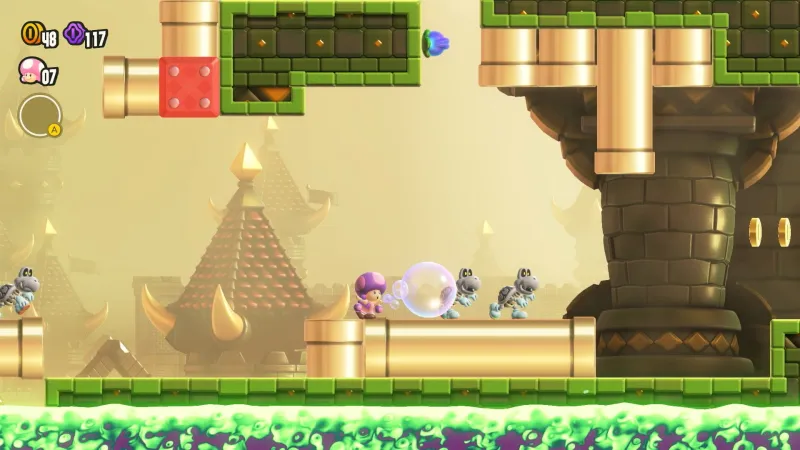
As I play through the stage, I encounter one of the big hooks shown in the trailer: Wonder Flowers. These special items are present in the various stages of the game and trigger in-game effects that have the potential to completely flip a stage on its head. That original trailer showed several, from Mario becoming tall and stretchy to another effect that causes the pipes to move around. The goal of these Wonder Flower sequences is to navigate the trippy effects to find a Wonder Seed, one of the game's primary collectibles. Each stage has multiple Wonder Seeds, one of which is hidden in the Wonder Flower sequence and another granted for reaching the end. Some stages have multiple exits, meaning in order to collect all the seeds, you must replay the stage and go through both exits.
Wonder wastes no time in providing me with another one of my most anticipated moments: the first time I turn into an elephant version of my character. I had a good idea this was coming, so I chose Peach because I was curious what her elephant form would look like. Turning fully pink, Elephant Peach retains many of the qualities that make her identifiable as the iconic princess of the Mushroom Kingdom but still fully embraces the absurd yet delightful new form. In this elephant form, you can attack enemies with your trunk, but that's not all that defining part can do; going near water while in elephant form allows your character to fill their trunk up with water, then spray the water when you swing your trunk. If you blast water on unbloomed buds, they grow to grant you extra coins or access to new areas.

Shortly thereafter, I find another elephant power-up, which I collect despite already having one. That item doesn't go to waste, though, as it sends it to my inventory. Similar to Super Mario World, you can have one extra item tucked away in your inventory box and then summon it when you need it.
Playing through the first stage immediately gave me confidence in how Super Mario Bros. Wonder is going to turn out; the controls are as tight as ever, and the combination of the Wonder Seed and Badge system injects life into the tried-and-true formula. However, the longer I played, the more I began to grasp just how far Nintendo is pushing its ideas forward.

Multiplayer Options
The next stage I play is Scram, Skeddadlers. Skeddadlers are a new enemy type that runs as soon as they see you, resulting in a chase if you want to grab what they have. Before I entered this stage, I turned on a new persistent online mode that lets you see the shadows of other players in the stage at that exact time. As you move through it, you'll notice cardboard Standees. These are left by other players as an almost "I was here" trophy. Each player can leave one per stage.
However, in addition to bragging rights, they also offer help to players; if you die in view of a Standee you activated, you can revive back at the cutout. Nintendo suggests that if you feel benevolent, leaving a Standee just before a difficult part is a great way to help out your fellow players. New Standee, as well as Badges, can be purchased from the in-game store using the purple coins you gather from around the stages.
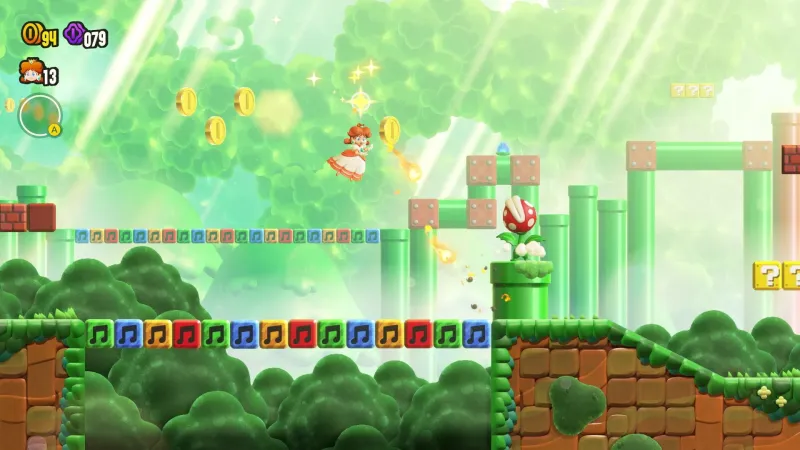
The next stage I play is Bulrush Coming Through, another level shown in the trailers. This time, I tackle it as Luigi. In this level, you must avoid charging Bulrushes, enemy types that resemble bulls. However, if you're savvy enough, you can trick them into charging through barriers and opening new paths to secrets for you. The stage culminates in me collecting a Wonder Seed, which triggers a Bulrush Stampede. I hop on top and ride them all the way to the end, but they plow right through the flagpole and continue along. I keep riding, collecting more purple and gold coins as the stampede rages on, and I finally reach the alternate exit, collecting a final Wonder Seed. Bulrush Coming Through is an example of a stages with multiple exits, and therefore, three Wonder Seeds.
Next, I jump into an online multiplayer session. Rather than straightforward co-op play, when you jump online with friends in Super Mario Bros. Wonder, you're thrown into competitions. For my session, I played a Badge Challenge focused on the Wall-Climb Jump Badge I mentioned earlier. In this, I'm given a vertical stage and am tasked with reaching the top and jumping on the flagpole before the other players in my session. During these sessions, which can house up to four players, you can see your competition's shadows but can't interact with one another, and nothing they do affects your world, meaning if they defeat an enemy, that creature still exists in your session. While I didn't get a chance to play it, you can apparently also turn any course in the game into a Friend Race.
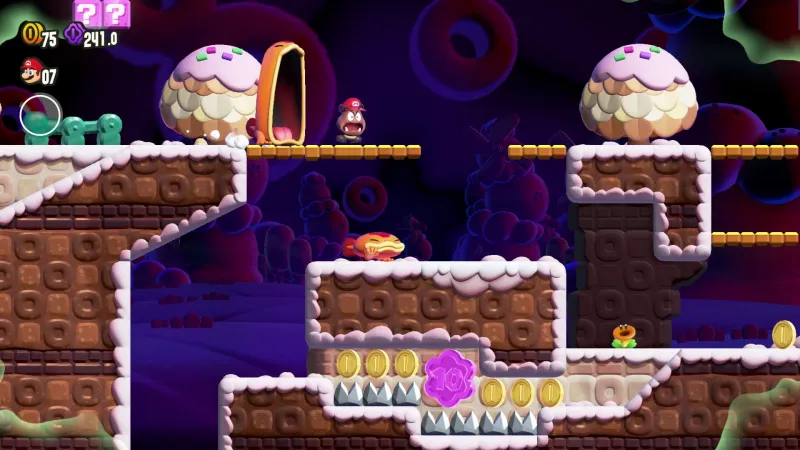
And, of course, you can still play traditional local co-op. Unlike what we've seen in games from the New Super Mario Bros. series, which often upped the amount of on-screen chaos the more people joined the session, you can't interact with one another outside of being able to ride Yoshi. That means that you can't pick up your teammates, and you won't inevitably bounce off your friend's head and into a lava pit. In local co-op, every character uses the same badge, so communication will be key in determining how you want to power your characters up prior to heading into the stage. For every character that joins the session, you get an inventory box for them, so you don't need to worry about fighting over the one extra item you have in single-player.
More New Courses
In co-op, I play through three more stages: Jewel Block Cave, Maw-Maw Mouthful, and Bloomps of the Desert Skies. Jewel Block Cave is, as the name implies, in a dark cavern with several breakable jewels that house various secrets. Here, we grab a new power-up: the Drill Mushroom. This allows us to drill underground and beneath obstacles, then emerge and deal devastating damage to enemies. We use it on multiple occasions to uncover secrets. The action culminates after we grab the Wonder Flower, and it becomes a race to the bottom as a crushing ceiling pushes downward, and we need to break through the cave's gems to escape.
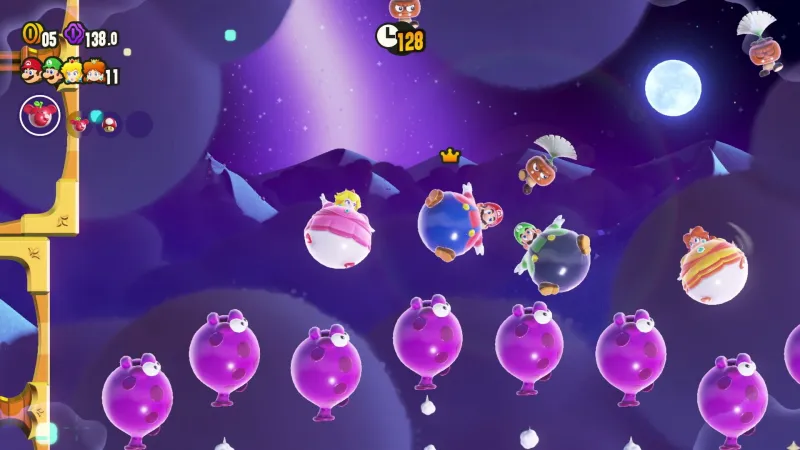
Maw-Maw Mouthful introduces a new enemy and power-up. Maw-Maws are large-mouthed creatures who want to eat everything in sight – and they will, if you let them. Not only did we watch them eat Goombas, but a Maw-Maw also stole a Bubble Flower before we could grab it. The Bubble Flower is the new power-up of this area, allowing you to toss bubbles that can not only hit enemies but also act as destructible platforms you can use to reach new areas. As always, one of the highlights comes from the Wonder Flower; this time, our team is transformed into Goombas who can't jump but must somehow avoid the Maw-Maws, who seem desperate to eat them. It essentially takes the fast-paced platforming of the game and injects a little stealth into the mix.
The final stage we check out is Bloomps of the Desert Skies. Here, we encounter Bloomps, who are inflatable enemies that seem like a balloon-based combination of the in-universe dolphins and Bullet Bills. Over the course of the stage, I used the Bloomps to reach new areas, which allowed for some creative level design. In the final Wonder Flower segment I played, our characters turned into balloons, and we were tasked with ascending and exploring a new area to find the Wonder Seed. This segment really hammered home just how diverse the gameplay options on offer are in Super Mario Bros. Wonder, and I was sad to have to put the controller down once we finished.
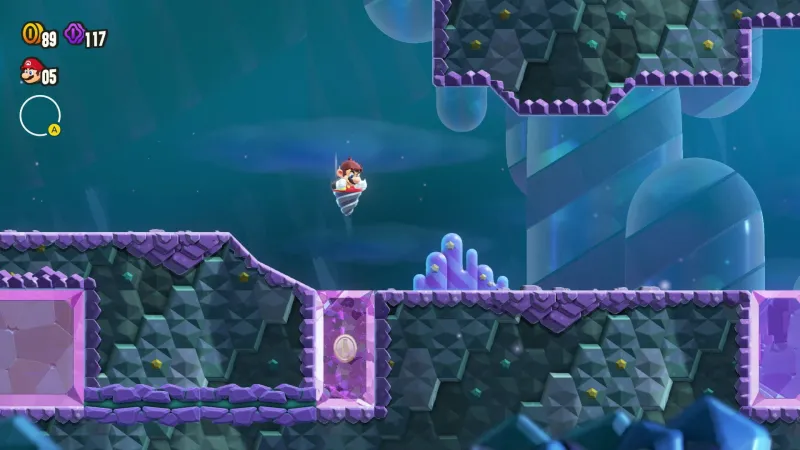
Super Mario Bros. Wonder feels like the most creative 2D Mario game in years. Even beyond the implementation of the Wonder Flowers, Super Mario Bros. Wonder feels like a fresh direction for the franchise, even as its core mechanics bring us back to where it all began. First the first time in a long while, I feel genuine surprises await me around every corner of a new 2D Mario game, and I cannot wait to experience them and the certain delights they will bring. Super Mario Bros. Wonder arrives on Nintendo Switch on October 20.
PurchaseSource: Game Informer
Comments
Post a Comment